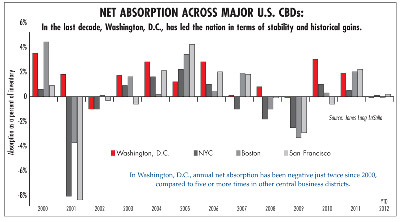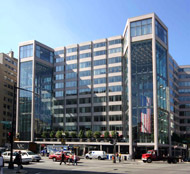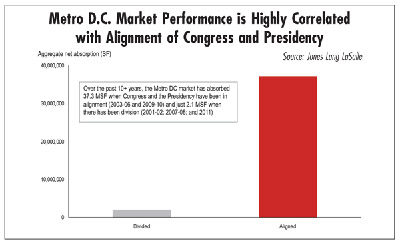|
COVER STORY, JULY 2012
OFFICE LEASING ACTIVITY SLOWS in D.C.
In an election year fraught with uncertainty, leasing activity in the nation’s capital is at a virtual standstill.
Savannah Duncan
With the focus on November’s presidential election currently all-consuming for the business community, the Washington, D.C., metro office market has experienced a slowdown in leasing activity.
Overall vacancy rates in the first quarter were 12.2 percent, up slightly from 11.9 percent in the fourth quarter of 2011, according to Cushman & Wakefield. Additionally, the market posted negative absorption of 452,364 square feet. Renewals were not included in the leasing statistics.
“We’re seeing a slowdown in tenant demand,” says Wendy Feldman Block, managing director of Studley’s Washington, D.C., regional office. The company is a commercial real estate services firm that focuses on tenant representation.
“There’s just so much uncertainty because of the federal budget, the debt crisis, the cost of energy and outsized exposure to government leasing,” explains Block. “A lot of government agencies in private-sector firms are in a holding pattern and that won’t change until after the election.”
While the government is definitely the largest tenant in the region, other industries such as law firms, non-
profits, trade associations, corporations, government contractors and professional firms are present in the market as well.
“With the government putting the brakes on spending, it’s going to have some effect on absorption, demand and activity,” says Rich Rhodes, managing principal of Cresa Partners’ Bethesda, Maryland, office. Cresa, which specializes in tenant representation, is involved in 5,000 to 6,000 transactions nationwide at any given time.

Recent Transactions
Although leasing activity is sluggish, a few sizable lease transactions have taken place during the past several months. The largest deal was in December 2011 when the U.S. Department of State leased the 463,151-square-foot former World Bank building in the CBD.
The transaction enabled the tenant to consolidate occupied space at six different office buildings into one. Studley represented the tenant in the transaction and Cassidy Turley represented the landlord.
 |
The American Bar Association signed a 61,000-square-foot lease to relocate its
national headquarters to 1050 Connecticut Avenue NW in June 2013. |
|
The American Bar Association signed a 61,000-square-foot lease in March in the CBD as well. The firm will relocate its national headquarters from 740 15th Street NW to 1050 Connecticut Avenue NW in June 2013. Studley represented the tenant in the lease transaction and Cushman & Wakefield represented the landlord, Lerner Enterprises.
Despite the activity, the vacancy rate in the CBD in the first quarter of 2012 was 13.1 percent, the highest it has been in 15 years, according to Cushman & Wakefield. “The U.S. Department of State lease was not enough to offset space added to the market elsewhere in the CBD,” says Paula Munger, regional research director for the Mid-Atlantic region at Cushman & Wakefield.
Three major tenants — KPMG, the Federal Housing Finance Agency (FHFA) and the Internal Revenue Service (IRS) — downsized or vacated the CBD. At 2001 M Street NW, 195,000 square feet was vacated by KPMG and other tenants during the first quarter of the year. KPMB downsized with a 76,000-square-foot lease at the end of 2011 to move to 1801 K Street NW, also in the CBD. The IRS and FHFA vacated 126,000 square feet at 1750 Pennsylvania Avenue NW and the FHFA also vacated 100,000 square feet at 1625 Eye Street NW. The GSA signed a 100,500-square-foot lease on behalf of the IRS at 999 North Capitol Street NE in the Capitol Hill/NoMA submarket. FHFA consolidated its operations into a 335,000-square-foot space at 400 Seventh Street SW in the Southwest submarket.
“The GSA leases space on behalf of various government agencies; if that agency doesn’t need the space, another agency may take it,” Munger says. “So it’s difficult to know which agencies are physically in the space. Also, they may vacate the space over time — and the flip side of that is they may move into the new space over time.”
Besides the CBD, two other submarkets have experienced some leasing activity as well. In the East End submarket, the Nuclear Energy Institute signed a 50,861-square-foot lease and IREX leased 38,000 square feet. The vacancy rate in the East End the first quarter was 10.4 percent, the second lowest in the D.C. metro area.
Tenants have also been signing leases in the West End, where the first-quarter vacancy rate was 12.4 percent. GMMB leased 46,340 square feet and U.S. News & World Report signed a 35,000-square-foot lease.
Despite leasing activity inching along, office investment sales in metro D.C. continue to heat up, creating what some might view as a disconnect in the market. However, the properties that are selling are at or near full occupancy, making them extremely attractive to investors looking for financially stable office properties.
According to Cushman & Wakefield, nine office properties sold in D.C. in the first quarter of this year, representing $979 million in total volume. Additionally, there are 17 office properties currently on the market.
Munger adds, “If you look at the buildings getting sold, the vast majority of them are well-leased, core office properties.”

What Tenants Want
As a result of the deceleration in leasing activity, tenants have the upper hand in lease negotiations. “Landlord concessions are up and they’ll be up for a while,” says Art Santry III, senior managing director and principal of brokerage firm Cassidy Turley. He operates out of the company’s Washington, D.C., office.
“The bottom line is deals are being done and tenants are relocating, but there’s also an abundance of space,” Block says. “Landlords are going hard after tenants.”
In 2011, concessions such as tenant improvement dollars and free rent reached a record high. “We are maintaining that level. You’re not going to see any change until the first or second quarter of 2013,” Block adds.
Providing tenants with money for build-outs, offering lower rents or allowing tenants to terminate a lease with some penalties are just a few of the concessions Rhodes says he has been able to arrange. “From a tenant’s perspective, there couldn’t be a better time to negotiate deals than right now,” he adds.
While landlords are generally hesitant to grant concessions, they have remained flexible on some lease terms. The average length of a lease used to be 10 years, but there has been a shift to three-, five- and seven-year terms, says Jamie Scully, brokerage manager of Cushman & Wakefield/Thalhimer’s Fredericksburg, Virginia, office.
“Because landlords anticipate that the market will improve, they are willing to commit to a short-term deal at what they perceive to be below historical value,” he says.
Because the market is soft, tenants are taking advantage of the opportunity to upgrade their space at rents that are not astronomical. To minimize any cost increase, tenants who choose to relocate to more desirable space frequently reduce their footprints. It’s not just a flight to quality, it’s a flight to efficiency, Block says.
On the other hand, Santry notes that some tenants will renew their leases to avoid the cost of moving. “If you’ve been in a space for 15 years it might not be optimal, but if you don’t have to write that check, you’re not going to write it.”
Though it may be a tenant’s market now, a lack of new development in the pipeline in the D.C. metro area leads Scully to believe that landlords may soon have more leverage. “Supply is still out there but demand is coming back slightly,” he says. “The balance is coming back toward the middle.”
What Lies Ahead?
For the remainder of the year, several factors will contribute to a slow office market, including the downsizing of the federal government and the continued trend of tenants aggressively minimizing their occupancy costs, researchers at Cushman & Wakefield point out.
Still, Scully believes the fundamentals of the market will strengthen in the long run. “We are sheltered in that the government isn’t going anywhere, federal spending is generally going to be centered around D.C., and through that we benefit.”
In the meantime, “we are languishing in uncertainty,” says Rhodes of Cresa Partners.
©2012 France Publications, Inc. Duplication
or reproduction of this article not permitted without authorization
from France Publications, Inc. For information on reprints
of this article contact Barbara
Sherer at (630) 554-6054.
|
